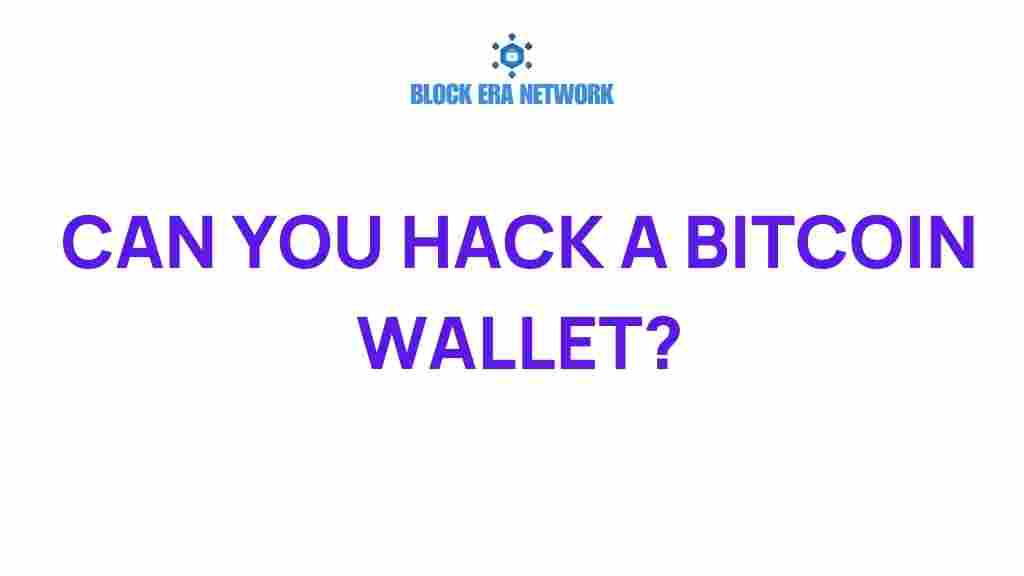Can You Hack a Bitcoin Wallet? The Unraveling Truth Behind Security
As the world of cryptocurrency continues to grow, so does the concern surrounding the security of digital assets. One of the most pressing questions on the minds of Bitcoin users is, can you hack a Bitcoin wallet? With the rise of cybercrime and hacking techniques aimed at stealing cryptocurrencies, understanding the security measures surrounding Bitcoin wallets is crucial for every investor. In this article, we will delve into the intricacies of Bitcoin wallet security, the methods used by hackers, and the steps you can take to protect your digital assets.
Understanding Bitcoin Wallets
A Bitcoin wallet is a digital tool that allows users to store, send, and receive Bitcoin. It holds the private keys necessary to access the user’s Bitcoin address on the blockchain. There are several types of wallets, including:
- Hot Wallets: These are connected to the internet and are more convenient for transactions, but they are also more vulnerable to hacking.
- Cold Wallets: Offline storage options, such as hardware wallets, that provide enhanced security against digital theft.
- Web Wallets: Wallets that operate through a web browser, which can be susceptible to phishing attacks.
Each type of wallet has its own level of security and convenience, making it important to choose wisely based on your needs.
The Reality of Hacking a Bitcoin Wallet
While the idea of hacking a Bitcoin wallet might seem straightforward, the reality is much more complex. Hacking a Bitcoin wallet is not as simple as breaking into a traditional bank account. Here are some key points to consider:
- Blockchain Security: The underlying technology of Bitcoin, the blockchain, is designed to be highly secure. Transactions are recorded in a decentralized ledger, making it extremely difficult to alter any information.
- Encryption: Bitcoin wallets use cryptographic algorithms to protect private keys. Without access to these keys, hackers cannot access the funds.
- Human Error: Many successful hacks are a result of human mistakes, such as falling for phishing scams or using weak passwords.
Common Hacking Techniques Used Against Bitcoin Wallets
Hackers employ various methods to compromise Bitcoin wallets. Here are some of the most common hacking techniques:
- Phishing: Attackers create fake websites or emails that mimic legitimate services to steal users’ login credentials.
- Malware: Malicious software can be used to access users’ devices and extract wallet information.
- Man-in-the-Middle Attacks: Cybercriminals intercept communications between the user and the wallet service, allowing them to capture sensitive data.
- Brute Force Attacks: Attackers attempt to guess passwords or recovery phrases through trial and error.
Each of these techniques highlights the importance of maintaining high levels of cryptocurrency security to protect against digital theft.
Steps to Protect Your Bitcoin Wallet
To safeguard your Bitcoin wallet from hacking attempts, consider implementing the following protective measures:
- Use Strong Passwords: Create a complex password using a combination of letters, numbers, and symbols. Avoid easily guessable information.
- Enable Two-Factor Authentication (2FA): Adding an extra layer of security through 2FA can significantly reduce the risk of unauthorized access.
- Keep Software Updated: Regularly update your wallet software and device operating systems to protect against known vulnerabilities.
- Educate Yourself: Stay informed about common scams and hacking techniques to avoid falling victim to cybercrime.
- Consider Cold Storage: For long-term storage of Bitcoin, consider using a hardware wallet or other forms of cold storage.
Troubleshooting Common Security Issues
If you suspect that your Bitcoin wallet has been compromised, here are steps to troubleshoot and secure your assets:
- Change Your Password: Immediately change your password and enable 2FA if you haven’t already.
- Check Transaction History: Review your transaction history for any unauthorized transactions and report them to your wallet provider.
- Scan for Malware: Run a comprehensive malware scan on your devices to identify and remove any threats.
- Backup Your Wallet: Ensure you have a backup of your wallet’s recovery phrase stored securely offline.
By taking these steps, you can mitigate the risks associated with hacking and ensure the safety of your cryptocurrency investments.
Conclusion: The Importance of Crypto Safety
While the question “Can you hack a Bitcoin wallet?” may evoke fear, understanding the security measures in place and taking proactive steps can significantly enhance your crypto safety. The world of cryptocurrency is inherently risky, but by staying informed about hacking techniques and implementing robust wallet protection strategies, you can protect your digital assets against potential threats.
As the landscape of cybercrime evolves, so too must our efforts to secure our investments. By prioritizing security and remaining vigilant, you can enjoy the benefits of using a Bitcoin wallet while minimizing the risks associated with digital theft.
For further reading on cryptocurrency security, check out this comprehensive guide on protecting your digital assets. Remember, the best defense against hacking is a well-informed and proactive approach.
Stay safe in the world of cryptocurrency, and always prioritize the security of your Bitcoin wallet.
This article is in the category Crypto Security and created by Block Era Network Team

1 thought on “Can You Hack a Bitcoin Wallet? The Unraveling Truth Behind Security”